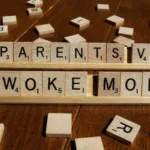
Published October 26, 2023
In the wake of a murderous rampage , there are three possible reactions: look with horror, look away, or look with approval. The third option might seem relegated to the mentally unfit or the sociopathic, but, as with mental illness itself, ” woke ” people have made it mainstream.
How do you know whether a murderous rampage is to be condemned or lauded? For the “woke,” what is permissible is based not on principle but on identity. Anything then can be justified, depending on who is doing it.
Recent polling of registered voters suggests that, without serious intervention, it will get worse. Close to half (48%) of 25- to 34-year-olds believe the Oct. 7 Hamas terrorist attacks that brutally targeted 1,400 innocent civilians in Israel can be justified by Palestinian grievance. Among 18- to 24-year-olds, it’s the majority at 51%.
This is not merely a matter of a blind spot that anyone might be prone to develop in a hyperpolarized context. Heated political disagreements are nothing new in most of our lives. Prioritizing politics over principles is not new, either. Mainstreaming a nihilistic movement that lionizes identity-based bloodlust is. It is a bloodlust that moved patiently, then abruptly, from academic abstraction into the streets.
To make sense of this, we need to understand that when the mask slips, “woke” ideology is a murderous one. Decolonization is a word that’s often used in the academy and one that many translate into a benevolent cry for justice. However, like most things “woke,” simply reading adherents’ literature is jaw-dropping.
One example is the preface by Jean-Paul Sartre in the seminal and still widely assigned work by Frantz Fanon, The Wretched of the Earth. Sartre details the process of decolonization, and like every iteration of Marxism, it seeks to induce a religious awakening by which members of a marginalized group begin to see in everything evidence of oppression. The psychology of the oppressed must move from contentment to suspicion to rage. In the belligerence of rage lies the revolution, for once captured by rage, a person finds evil everywhere but can no longer see it anywhere in himself.
“When his rage boils over,” Sartre writes, “he rediscovers his lost innocence and he comes to know himself in that he himself creates his self. … When the peasant takes a gun in his hands, the old myths grow dim and the prohibitions are one by one forgotten.” Sartre goes on, “The rebel’s weapon is the proof of his humanity. For in the first days of the revolt, you must kill: to shoot down a European is to kill two birds with one stone, to destroy an oppressor and the man he oppresses at the same time.”
Decolonization is not an ideology meant to remain specific to complex regions such as the Middle East. As the slogan that appears on signs, T-shirts , and Harvard University podcasts indicates, “Decolonize everything.”
“We live in a country of colonized cultures,” writes Samir Doshi, a race and technology practitioner fellow at Stanford. “The project that is the United States is a melting pot of bodies that have been marginalized from its inception. Still today, those who have been othered by supremacy culture continue to strive to cultivate a sense of belonging and freedom despite the perpetual attempts to oppress us.”
Why are students , professors , Black Lives Matter chapters, and queer and feminist activists rallying on the backs of terrorism? Because they have internalized the reductive binary that in every conflict, there is an oppressed identity group that can justify any means necessary against its oppressor.
Had a group of MAGA men terrorized and killed 1,400 illegal immigrants, it would be unconscionable to respond with a MAGA rally across America. It doesn’t matter that there are legitimate grievances about our open border policy. To rally as a response would rightly be interpreted as an endorsement of the murderous rampage.
That the mask slips and people begin to see the violence at the core of the “woke” movement is good and an opportunity to further a burgeoning political realignment . But for those in full embrace of “wokeness,” recasting the identities of the culprits illuminates nothing, for they have already internalized the logic of revolution. They don’t mind discarding former allies; they were never the point anyway.
“For the only true culture,” Sartre said, “is that of the Revolution; that is to say, it is constantly in the making.” Sartre removed the mask 60 years ago. Let’s not waste any more time letting leftists put the masks back on.
Noelle Mering is a Fellow at the Ethics and Public Policy Center where she co-directs EPPC’s Theology of Home Project. She is the author of the book Awake, Not Woke: A Christian Response to the Cult of Progressive Ideology (TAN Books, May 2021).












